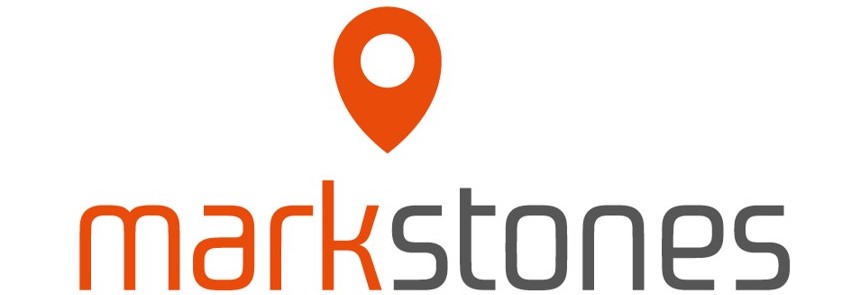Research Talks
Konzept des Research Talk
Die “markstones Research Talks” dienen als Plattform zur Vernetzung mit der nationalen und internationalen Forschungsgemeinschaft im Bereich Marketing. Führende WissenschaftlerInnen werden eingeladen, Forschungsprojekte zu präsentieren und aktuelle Trends und Entwicklungen in den Bereichen Marketing, Branding & Technologie zu diskutieren.
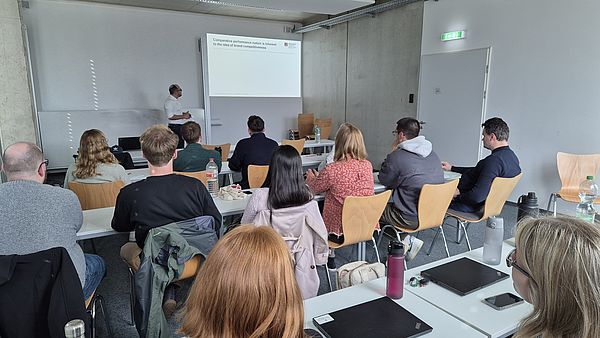
Dr. Rico Piehler, Macquarie University Sydney
„Brand competitiveness: Construkt und Measurement"
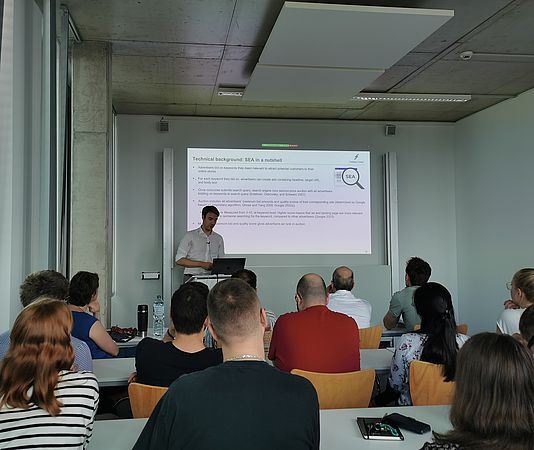
Prof. Dr. Alexander Bleier
"Revisiting SEA Effectiveness: Evidence from Remarketing Lists for Search Ads (RLSA)"

Prof. Dr. Lopo L. Rego
“Boardroom Ethnic Diversity, Marketing Strategy, and Firm Performance”

Professor Brent McKenzie, University of Guelph
“Evolution of Retail Service Quality in Estonia: From Communism, to Capitalism, and Covid”
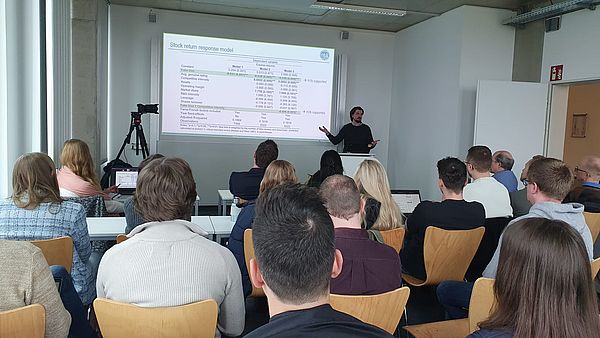
Prof. Dr. Thomas Scholdra
"Trick or Treat? The Stock Market Impact of Fake Reviews"

Dr. Rebecca Beech, Coventry University
“Moral Concern Versus Ethical Behaviour -
Lobbying for a Good Cause”

Prof.Dr. Caroline Wiertz, University of London, Cass Business School
“Cultured Robots: Exploring the Role of Temporality in Market Systems”
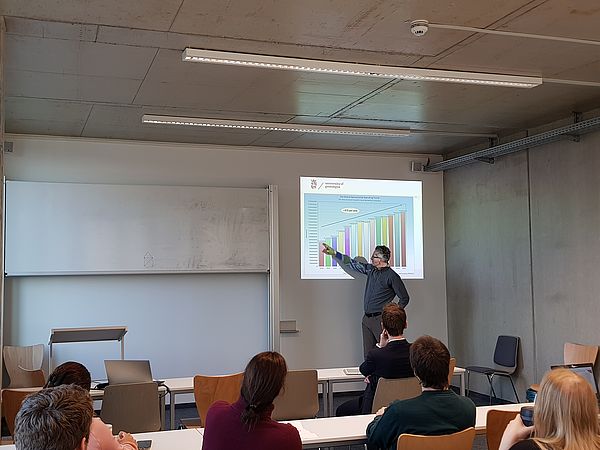
Prof.Dr. Tammo H. A. Bijmolt, University of Groningen
“How to Do Well by Doing Good: A Meta-Analysis of the Effectiveness of Cause-Related Marketing”

Prof.Dr. Dominik Papies, Universität Tübingen
“Economic Consequences of Safe Harbor Provisions for Content Industries”

Prof. Bernd Skiera, Goethe-Universität Frankfurt
"Economic Consequences of Restricting Tracking on the Internet via Cookies to Ensure Consumer Privacy"
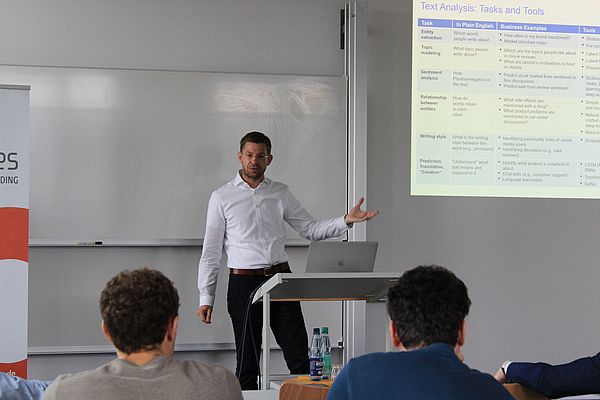
Prof. Daniel M. Ringel, University of North Carolina
“Mining the Evolution of Consumers’ Brand Perspectives: A Multi-Sense Temporal Neural Word Embedding”

Prof. Marcus Schögel, Universität St. Gallen
"Fundamente der Digitalisierung"

Prof. Denise Buhrau, Stony Brook University
"Approach and Avoidance Strategies in Health Goal Pursuits: The Moderating Role of Weight Status”.
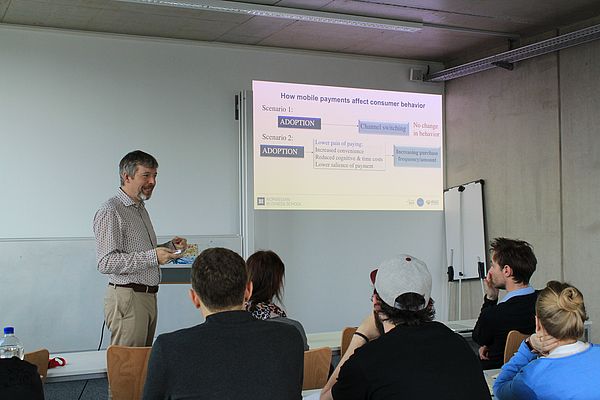
Prof. Koen Pauwels, Northeastern University
"It Pays to Pay Smart: Impact of Branded Mobile Payments on Purchase Behavior”.

Prof. Hernàn A. Bruno, Universität zu Köln
„Sticky Prices and Delayed Pass Through"
Überblick der bisherigen Research Talks
Sommersemester 2024
Brand Competitiveness: Construct and Measurement
A growing body of literature has been focusing on investigating the comparative performance of brands, i.e., brand competitiveness – defined as a brand’s outperformance of competing brands. While prior literature offers initial insights (Foroudi et al., 2020; Gupta et al., 2020; Winzar et al., 2018), in-depth investigations of the construct remain missing. In terms of the construct measures, existing studies use improvised or ad hoc scales, which might introduce methodological confounds, limiting attempts to establish generalised knowledge about the construct (Haws et al., 2022). Similar to other brand performance measures that fail to incorporate competition (Seggie et al., 2007; Winzar et al., 2018), brand competitiveness scales do not reflect the construct’s essential definition, in which brand competitiveness is a relative construct. This study introduces customer-based brand competitiveness (CBBC) and develops a seven-item scale as a powerful yet parsimonious tool to measure CBBC. It draws on signalling theory to provide a theoretical underpinning for the construct’s relevance and empirically investigates brand equity and purchase intentions as consequences of CBBC.
Sommersemsester 2023
Revisiting SEA Effectiveness: Evidence from Remarketing Lists for Search Ads (RLSA)
Joint work with Sebastian Schubach and Jan H. Schumann
A novel technology called Remarketing Lists for Search Advertising (RLSA) augments traditional search engine advertising (SEA) by allowing advertisers to adjust keyword bids based on information about searchers’ previous behavior in their online stores. In this research, the authors investigate the extent to which such information helps explain SEA effectiveness and in particular searchers’ response to an ad’s position on the search engine results page. First, the results from two observational field studies show substantial heterogeneity in click-through rates between previous visitors and searchers who have never been to the advertiser’s online store. In addition, click-through rates hinge on ad position but this effect weakens for previous visitors. It also diminishes for searchers who have advanced further in the conversion funnel at the advertiser’s online store. Last, the authors find that conversion rates conditional on click, in general as well as across ad positions, differ between consumers at distinct stages of the conversion funnel. The results yield theoretical implications and actionable recommendations that can help firms improve the effectiveness of their SEA efforts.
Abstract:
From the Soviet planned economic system to one of free enterprise through capitalism, the retail sector represented one of the most overt changes in Estonia. The concept of retail service quality had to be developed through education and practice. More recently, the COVID19 pandemic had a significant impact on retail shopping, in general, and service quality specifically. This research is based on the analysis of Estonian customer retail service quality survey data collected over 5, 5-year, periods (1999; 2004; 2009; 2014; 2019), as well as personal interviews with Estonian retail management personnel, post Covid.
About the person:
Dr. Brent McKenzie, PhD (Marketing, Griffith University); MBA (Finance/International Business, Dalhousie University); BA (History, McMaster University); is a Professor in the Department of Marketing and Consumer Studies, in the Gordon S. Lang School of Business and Economics. Dr. McKenzie is a leading expert on marketing, tourism, and management related issues in the Baltic States of Estonia, Latvia, and Lithuania. He is arguably the leading academic researcher on the retail sector in this region and has extensively published both academic and industry research in this field. He has conducted wide-ranging research projects in the region, while also serving as a visiting professor at such leading institutions as Tartu University, the Estonian Business School, and TalTech in Estonia; Stockholm School of Economics-Riga in Latvia, and ISM University of University of Management and Economics in Lithuania. Prior to academia, Dr. McKenzie served in leading positions in the corporate planning, treasury, and supply chain management divisions of Canada’s leading hard goods retailer, Canadian Tire.
Abstract:
Strategic review manipulation (i.e., buying fake five-star reviews) by third-party sellers on e-commerce platforms has become a prevalent phenomenon in the digital economy. A recent study by He et al. (2022) shows that sellers benefit directly from fake reviews, as it leads to a 16% better sales rank. This is good news for resellers who engage in review manipulation. But does it also apply to brand manufacturers? How do fake reviews affect their stock returns? Based on prior research on the online word-of-mouth performance relationship, one might assume that manufacturers also benefit from any positive online reviews in the form of higher revenues, earnings, and ultimately higher firm value. The authors show, however, that the occurrence of fake reviews poses a serious threat to the firm value of brand manufacturers. Using a scaling approach, the authors develop a machine learning-based fake review detection model that learns from observations of actually bought fake reviews. The empirical analysis of more than 14 million reviews shows that a fake-review-induced rating bias (i.e., difference between the manipulated and the genuine rating) is negatively associated with stock returns. Negative financial consequences are amplified when firms face high levels of competition. The study results provide important theoretical, managerial, and policy implications regarding the regulation and prevention of deceptive review practices.
About the person:
Thomas Scholdra is IFH-Endowed Assistant Professor of Marketing and Retailing at the University of Cologne since November 2022. Previously, he has been a post-doctoral researcher at the Chair of Retailing and Customer Management (Marketing Area, University of Cologne). Before joining the Marketing Area, he received his doctoral degree from the University of Bremen in 2019. In his research, Thomas Scholdra focuses on (the future of) retailing, (digital) advertising, and the impact of marketing strategy on firm performance. His work has been published in leading international outlets such as the Journal of Marketing and the Journal of International Marketing.
Sommersemester 2021/22
Abstract:
Online activism is a modern-day phenomenon present within online communities. Sustainable fashion is a current movement resulting from consumers' heightened environmental awareness and organisations becoming ‘greener’. Driven by hashtags, online communities are hubs for lobbyists and influencers who desire change from clothing brands. This study undertook focus groups and interviews to probe users’ lobbying behaviours via knowledge sharing within an online community. Two user types emerge. One shares knowledge to lobby others, driven by a desire for change. The other shares knowledge, led by their green beliefs, resulting in unintentional lobbying for change. This paper contributes insight into online lobbyists' behaviours and drivers. The challenge is to encourage online users to realise there will be consequences, intended or not. In the case of a ‘good cause’ such as sustainability, a moral concern does not justify what others might view to be unethical behaviour, heavy-handed pressurising or misleading lobbying.
About the person:
Rebecca Beech is Lecturer in Business Management at the Coventry University. Her research interests include knowledge sharing, online communities, digital research methods, sustainable consumption, pro-environmental behaviour, and sustainable fashion. Rebecca Beech has completed her PhD in 2020 with the title: Understanding Knowledge Sharing in an Online Community: Within the Context of Green Clothing.
Wintersemester 2019/20
Abstract:
Market systems research focuses on how discursive negotiations among market stakeholders spur change and determine what becomes “valuable and virtuous” or “worthless and immoral”. Surprisingly, we know little about the role of temporality in market change and its impact on market speeds. Based on a comparative discourse analysis of news media coverage of robots in Britain (3,023 articles) and the United States (2,104 articles), we find that market systems create culturally informed discourses about the future, which in turn establish the moral regime within which market stakeholders must operate. The moral regime in a local cultural context is a consensus on the resources available to describe desirable and disagreeable future outcomes of market-driven change. We find that the US is morally permissive towards robot technologies by highlighting their potential to contribute to a service-oriented convenience society. The UK is morally restrictive towards the same technologies by invoking the UK’s class system and highlighting robot technologies’ potential to take away workers’ rights and work itself. UK market stakeholders want the future to slow down, while US market stakeholders want it to speed up. As a result, we observe that market systems function as “time machines” that determine market speeds, i.e., how fast the future is permitted to arrive in a particular cultural context.
About the person:
Caroline Wiertz is a Professor of Marketing, the Head of the Marketing Group, and an Associate Dean at Cass Business School, City, University of London. Her main research interests lie in the areas of consumer research and digital and social media marketing. Her work has been published in leading academic journals, including the Journal of Consumer Research, Marketing Science, the Journal of the Academy of Marketing Science, and the International Journal of Research in Marketing. She is a member of the Editorial Review Board of the International Journal of Research in Marketing, the Journal of Interactive Marketing and the Journal of Business Research.
Abstract:
“How to Do Well by Doing Good: A Meta-Analysis of the Effectiveness of Cause-Related Marketing”
Cause-related marketing (CM) ties a brand’s philanthropic engagement to a sales promotion. Due to its dual nature, CM has been shown to evoke both positive (warm glow) and negative (consumer skepticism) consumer responses. Yet, current research has produced inconclusive evidence, and it is unclear to what extent and under what conditions (moderators) CM influences attitudinal and behavioral outcomes. This meta-analysis therefore synthesizes the empirical evidence about both the CM main effect and relevant CM moderators across 160 papers, reporting 229 studies. The authors find a moderate and positive main effect of CM. This effect is highly contingent on factors related to four dimensions: the for-profit partner, the non-profit partner, the donation, and the campaign communication. In particular, the meta-analysis reconciles previously inconclusive evidence on the most studied CM moderators (fit between the for-profit and the donation target, hedonic product type, donation level) and further reveals several significant novel CM moderators. Overall, the generalizations inform researchers and managers about expected effect sizes when executing CM, compare its effectiveness to other CSR activities and price promotions, and provide a systematic agenda for further research.
About the person:
Tammo H.A. Bijmolt is Professor in Marketing Research at the University of Groningen and director of the Groningen Digital Business Centre. His research interests include loyalty programs, retailing, e-commerce, advertising, and meta-analysis. On these topics, Tammo Bijmolt has been involved in numerous research projects in collaboration with companies and international co-authors. His publications have appeared in leading international journals, such as Journal of Marketing, Journal of Marketing Research, Marketing Science, Journal of Consumer Research, and International Journal of Research in Marketing. He is vice-president conferences of the European Marketing Academy.
Abstract:
User-generated content (UGC) platforms provide consumers with access to content that is uploaded by users who do not hold the copyright to this content, and these platforms are not liable for restricting users from uploading the content due to “safe harbor” provisions. On many UGC video streaming platforms (e.g., YouTube) music is among the most popular content, raising the question of whether UGC platforms are beneficial for rights holders in the music industry (e.g., music labels and artists). On the one hand, UGC platforms pay fees to rights holders and may divert consumers from illegal piracy sites. On the other hand, these fees are only a fraction of what subscription-based audio streaming services (e.g., Spotify) pay, and UGC platforms may hinder the adoption of these services and displace paid downloads. Despite the ongoing controversial public debate, the relevance and magnitude of these effects have not been studied. To analyze how UGC video music streaming impacts (1) music consumption in other channels and (2) the total recorded music revenue, we compile a dataset covering music consumption via all major channels for 790 songs over a period of more than two years. We investigate these relationships using a simultaneous equation system and find that although UGC video streaming services generate income and reduce piracy, their effect on total revenues is negative because of the cannibalization of paid downloads and audio streaming channels.
About the person:
Dominik Papies is a Professor of Marketing at the School of Business and Economics at the University of Tübingen. His substantive research interests focus on how digitization and new technology affect markets and business models. In the methodological domain, Dominik Papies studies the boundaries of established and the potential of new methods of addressing endogeneity in market response models. His research has been published in the top-tier journals of the field (e.g., Journal of Marketing, Marketing Science. His work has been funded, among other, by the German Research Foundation (DFG).
Abstract:
Cookies enable companies to collect and exchange extensive information about users. This information is often used to improve the performance of online advertising. Yet, the collection of information leads to a loss of privacy. Accordingly, EU policy makers have put forward initiatives to restrict cookie usage. So far, there exists very little empirical knowledge on the trade-off between user privacy and the economic value that website publishers, advertisers, and even users derive from cookies. As a result, policy makers have no way of telling whether their restrictions on cookies have the intended positive consequences for user privacy, or whether any benefits are outweighed by negative effects on the profits of companies. To begin to fill this gap on the cost side of this discourse, we estimate the potential upper-bound of an economic loss for digital publishers of lifespan restrictions on cookies. Our analysis is based on an empirical study on cookies of 54,127 users who received about 130 million ad impressions over almost 2.5 years. Restricting their lifetime to one year as the European Union proposes decreases their cookie lifetime value by 14.1%. In light of the €10.6 Bn. cookie-based display ad revenue in Europe, such restrictions would endanger each year €180 Mio.
Zur Person:
Professor Dr. Bernd Skiera hat seit 1999 den damals ersten Lehrstuhl für Electronic Commerce in Deutschland an der Goethe-Universität Frankfurt am Main inne. 2018 hat er den Long-Term Impact Award des Journal of Marketing erhalten. Seine Forschungsschwerpunkte sind Electronic Commerce, Online-Marketing, Marketing Analytics, Privatsphäre von Konsumenten im Internet sowie Kundenwertmanagement. Aufgrund seiner beruflichen Erfahrungen, u.a. als Software-Entwickler bei SAP und als Gesellschafter von Marini Systems (www.marini.de), interessieren ihn ganz besonders Fragestellungen an der Schnittstelle zwischen Wirtschaftsinformatik und Marketing.
Sommersemester 2019
Abstract:
In an era of rapidly changing and evolving markets, firms’ marketing agility has become a key driver of competitive advantage. Marketing agility, however, requires very timely and ongoing insights into markets. Over the past decade, marketers have thus turned to a rich, abundant and very timely data source, namely user-generated-content (UGC). Extracting insights from UGC, however, is challenging since such data are usually very big and unstructured. To overcome this challenge, researchers recently started to employ methods from the field of natural language processing (NLP) such as the popular word2vec model. However, it suffers from two major shortcomings: 1) it is unable to distinguish between multiple meanings of a word, and 2) it does not capture changes over time. We overcome the shortcomings of word2vec with a new model named Dory that is inspired by human memory-systems. As we show by simulation and in an empirical application, Dory’s additional qualities of human memory-systems enable it to detect patterns in consumers’ brand perspectives that remain undetected by extant models.
About the person:
Professor Ringel is a managerial data scientist interested in creating insights into today’s large markets. His research interests include competitive analysis, data visualization, neural learning, unsupervised learning and the analysis of unstructured data. He currently studies the evolution of markets, the attention economy, and temporal information in natural language processing. His goal is to provide firms with tools and models that inform their strategic decision making. Professor Ringel worked for more than 10 years in management consulting.
Abstract:
Digitalisierung ist das Schlagwort der Stunde. Vielfach wird damit ein revolutionärer Wandel in Verbindung gebracht, der traditionelle Branchenstrukturen innerhalb kurzer Zeit auf den Kopf stellt und bestehende Unternehmen durch neue Geschäftsmodelle verdrängt. Dabei wird «neu» und «innovativ» auch gleichzeitig als «gut» verstanden. Vielfach werden dabei aber grundlegende Fundamente der Digitalisierung vernachlässigt und falsch interpretiert. Auf Basis der Ergebnisse verschiedener Forschungsprojekte und Unternehmenskooperationen zeigt der Vortrag die grundlegenden Treiber der Digitalisierung auf, ver-sucht Missverständnisse auszuräumen und die Entwicklungschancen aus einer marktori-entierten Perspektive aufzuzeigen.
Zur Person:
Prof. Dr. Marcus Schögel ist Direktor des Instituts für Marketing an der Universität St. Gallen und Leiter des neukonzipierten Masters in Marketing Management. In der Forschung beschäftigt er sich mit den Herausforderungen, die sich aus einer «interaktionsorientierten Marketingperspektive» ergeben. Er arbeitet dabei an der Bewältigung der Herausforderungen von kundenzentrierten Unternehmensstrategien, marktorientierten Veränderungsprozessen in Unternehmen und der Realisierung von erfolgreichen Go to marketStrategien.
Abstract:
Healthy eating strategies can be based on approach (foods one should eat) or avoidance (foods one should not eat). Previous research has reported mixed findings for the effectiveness of these strategies. The current research examines whether weight status moderates the effectiveness of approach and avoidance strategies in goal pursuit. Using an ideal weight goal context, this research shows that approach strategies motivate goal-consistent behaviors among people with poor weight status by increasing the perceived attainability of the goal. Avoidance strategies are more motivating among people with good weight status because they decrease the perceived progress toward the goal, which increases the perceived need for additional effort in the form of goal-consistent behaviors to ensure timely attainment.
Abouth the person:
Denise Buhrau is an Assistant Professor of Marketing at Stony Brook University, NY. She received her PhD from Tulane University. Professor Buhrau conducts research on consumer behavior, with a particular focus on judgement and decision-making in health-related contexts. Her research attempts to identify communication strategies that can be used to help vulnerable consumer segments to engage in better health decision making by exploring messages and strategies that utilize innate motivators. Her work has been published in leading marketing journals such as the Journal of Consumer Psychology, and leading journals in other disciplines such as Appetite in the field of nutrition and dietetics and the Journal of Studies on Alcohol and Drugs in the field of substance abuse.
Abstract:
As of 2017, a third of internet users worldwide has “used a mobile payment service in the last month”, with forecasts projecting over 1.1 billion proximity mobile payment users worldwide by 2021 (Statista, 2019). Mobile payment methods and apps are key technologies of interest to managers, who are unsure about the business impact. This is one of the first studies to differentiate between different forms of cashless mobile payments: SMS mobile payment only, SMS mobile payers who downloaded the app but never switched to app mobile wallet, and mobile wallet users. For a large, international beverage brand sold in vending machines, difference-in-difference-in-differences (DDD) methodology we find that different forms of mobile payments have different potential to impact purchase behavior.
About the person:
Professor Pauwels’ research is at the interface of marketing productivity, metrics and social media. Through time series econometrics, he quantifies how marketing actions affect offline and online consumer behavior, and how these in turn lift company performance. Prof. Pauwels is a worldwide expert in modeling such long-term effects of advertising, pricing and channel changes, and product innovation. His work has appeared in journals such as Journal of Advertising Research, Journal of Interactive Marketing, Journal of Marketing, Journal of Marketing Research, Marketing Science and Management Science. He teaches Marketing Performance at the masters and undergraduate levels.
Abstract:
The paper challenges two conventional notions: that changes in costs are not completely pass-through to the customer, and that this pass-through is asymmetric (cost increases are more likely to be passed through than cost decreases). We show that what looks like incomplete pass-through can also be seen as the salespeople passing-through the cost over time, i.e., in later transactions. We also show that the asymmetry that has been reported in the literature depends on the price level at which a salesperson is operating and it can go in either direction.
About the person:
Hernán A. Bruno is a Professor of Marketing and Digital Environment at the University of Cologne since September 2015. Before joining the University of Cologne, Professor Bruno was a faculty member at INSEAD in Fontainebleau, France (2008–2015) and at Erasmus University in Rotterdam, Netherlands (2007–2008). He holds a Master in Research and a Marketing Ph.D. from London Business School. Prior to his career in business academia, he was a researcher in Analytical Chemistry at the University of Buenos Aires and a consultant at McKinsey & Company. Professor Bruno models marketing phenomena using tools from statistics and economics. His models attempt to discover hidden patterns in marketing data. These models can be applied as a support in marketing decision making or used to generate insights into basic marketing phenomena. His work has been published in leading marketing journals, such as Marketing Science and Journal of Marketing Research.

